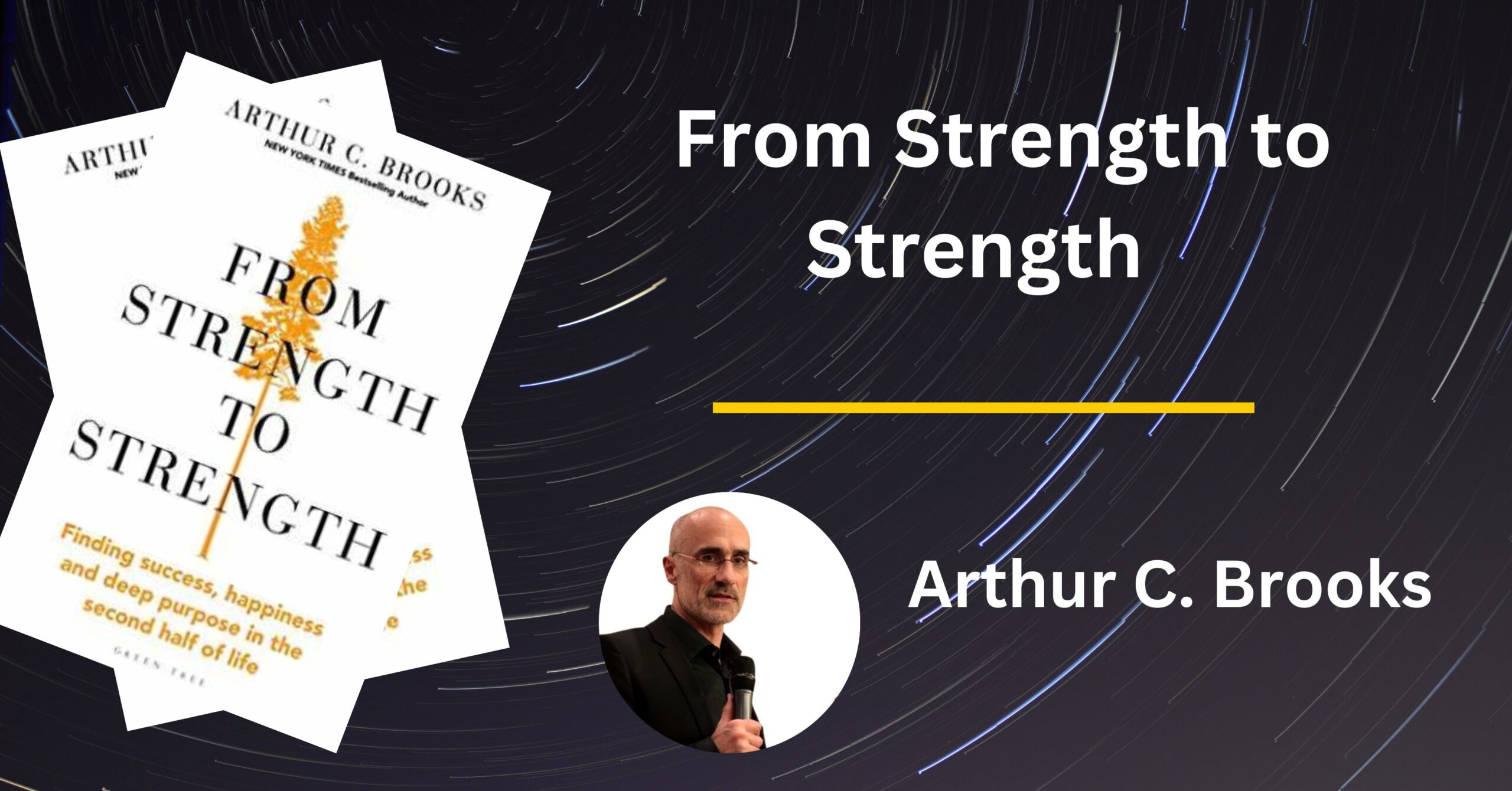From Strength to Strength – Arthur C. Brooks
Thanks Michael Hyatt for recommending From Strength to Strength by Arthur C Brooks.
This book talks about finding success, happiness, and deep purpose in the second half of our lives. The author starts with his encounter with a world-famous person on a plane who was in the latter half of his life. However, he was surprised to learn that the person did not feel good about himself despite a large fan following. Charles Darwin was a world-famous researcher and leader in evolutionary biology. However, he did not feel too good about himself in the later part of his life.
Alcoholism Vs Workaholism: The author compares Alcoholism (addiction to alcohol) with Workaholism (addiction to work (success). Both are problems. Too much work is not good.
Chipping Away: Thomas Aquinas and Gautama Budha are discussed in the book. Thomas was poised to succeed in the first Benedictine monastery. However, Thomas had no interest in worldly glory. Thomas chipped away to find his true self. If Thomas had become a fancy Benedictine abbot, the only record of his life would have been on the list of abbots of middle age. However today he is celebrated as the greatest philosopher of his age. The same is true for Gautama Buddha. The key is to have less and also be detached. Detachment from success is great.
Finding Happiness: The author recommends seven things to do to find happiness
- No smoking
- Quit Drinking (if you drink)
- Avoid Obesity
- Exercise
- Confront problems directly without unhealthy behavior
- Be a Lifelong Learner and
- Stable Long-term relationships. The author also writes that research has shown that good marriages and monogamy lead to a happier life.
Vanaprastha – The author writes about his trip to India and how he met his guru (Sri Nochur Venkataraman also called Acharya). Ancient Indian teaching prescribes that life must be lived in four stages.
- Bramacharya, (period of youth and learning)
- Grihastha (builds career, accumulates wealth, and builds a family)
- Vanaprastha – retiring into the forest in the literal sense, however, it means cultivating spiritual skills, pulling back from old professional duties, and more.
- The last stage is Sannyasa – Old age or the last stage of life where one would rest his/her life at the feet of masters. This is also called infinite truth.
Weakness is a strength: The author suggests making one’s weakness his/her strength. He also recommends openly talking about one’s weaknesses and turning them into a strategic advantage.
Saint Paul (Saul of Tarsus), instrumental in spreading Christianity – alive even after two thousand years and has more than two billion followers. To his followers, St. Paul openly talked about his weakness and sufferings. His clear purpose was to show them the great Paul, visionary Paul was also flawed, mortal, and weak. The author writes that the secret of going from strength to strength is to recognize that your weakness, your loss, your decline – can be a gift to you and others. The authors also write that organizational leaders are happier and also perceived as more effective by their subordinates when they are vulnerable and human.
Ludwig van Beethoven (17 December 1770 – 26 March 1827): The world-famous musician Beethoven was already famous by his late 20’s. However, his hearing ability was getting weaker, and he was going deaf. He gave up performing but found new ways to keep composing. Although he was entirely deaf, in the final ten years of his life, he composed and revolutionized music that defined his distinctive style and established himself as one of the greatest composers of all time. At the age of 56, he passed away.
The author writes that it is a superpower to share your weakness without caring about what others think.
New things pop up every decade: The collapse of the Soviet Union (1990’s), a decade later, the 9/11 terrorist attacks, in 2008 we saw the financial crises, and a decade later we had COVID-19. In another decade we will have something new.
Lucius Quinctius Cincinnatus: In 458 BC, Cincinnatus was the dictator of Rome when the city was under siege, and he led Rome to victory. However, when he was in power, he voluntarily resigned, retired to his small farm, and lived humbly with his family. A city in Ohio is named after him. It is good to voluntarily resign and try new things and decide,
- What activities will you keep?
- What activities will you evolve and do differently?
- What activities will you let go of?
- What new activities will you learn?
You have to jump and take the plunge. (The work you do has to be the reward and you have to enjoy it).
Arthur also quotes the man he met on the plane at the end of the book, thanks him for awakening him, and also hopes he finds peace and gains strength in his life.
Thanks, Arthur. It was good to read your book and prepare for the future ahead.
If the first half of life is spent trying to establish oneself and creating a place in the world, the second part of our life should be immersed in reflecting our actions and distilling our experiences and perceptions to find that deeper purpose.




Leave a Reply